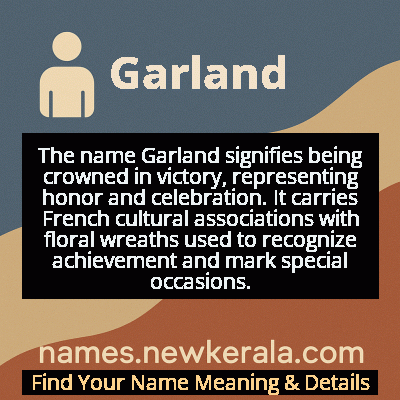Garland Name Meaning & Details
Origin, Popularity, Numerology Analysis & Name Meaning of Garland
Discover the origin, meaning, and cultural significance of the name GARLAND. Delve into its historical roots and explore the lasting impact it has had on communities and traditions.
Name
Garland
Gender
Male
Origin
French
Lucky Number
3
Meaning of the Name - Garland
The name Garland signifies being crowned in victory, representing honor and celebration. It carries French cultural associations with floral wreaths used to recognize achievement and mark special occasions.
Garland - Complete Numerology Analysis
Your Numerology Number
Based on Pythagorean Numerology System
Ruling Planet
Jupiter
Positive Nature
Optimistic, inspirational, and creative.
Negative Traits
Scattered, exaggerating.
Lucky Colours
Yellow, gold, purple.
Lucky Days
Thursday.
Lucky Stones
Yellow sapphire.
Harmony Numbers
1, 2, 9.
Best Suited Professions
Arts, writing, communication.
What People Like About You
Creativity, optimism.
Famous People Named Garland
Garland Jeffreys
Singer-songwriter
Influential American rock and reggae musician known for hits like 'Wild in the Streets'
Judy Garland
Actress and singer
Iconic performer best known for her role as Dorothy in 'The Wizard of Oz'
Red Garland
Jazz pianist
Renowned jazz musician who played with Miles Davis and developed the block chord style
Hamlin Garland
Author and poet
Pulitzer Prize-winning American novelist and short story writer
Name Variations & International Equivalents
Click on blue names to explore their detailed meanings. Gray names with will be available soon.
Cultural & Historical Significance
In French cultural contexts, the name Garland evokes images of floral wreaths used in celebrations, festivals, and religious ceremonies. The French 'guirlande' tradition includes decorative garlands used in weddings, holidays, and public festivities, symbolizing joy, unity, and communal celebration. This cultural heritage gives the name a distinctly European elegance while maintaining its universal appeal. The name's persistence through centuries demonstrates its enduring power to convey honor and achievement across cultural boundaries, making it a timeless choice that bridges ancient traditions with contemporary values.
Extended Personality Analysis
Individuals named Garland are often perceived as charismatic, creative, and achievement-oriented. They tend to possess natural leadership qualities and a competitive spirit that drives them toward success in their chosen fields. The name's association with victory and celebration suggests someone who enjoys recognition and knows how to celebrate accomplishments, both their own and others'. Garlands are typically seen as resilient individuals who can weather challenges and emerge triumphant, much like the wreath that survives the competitive process to crown the winner. They often exhibit artistic sensibilities and a flair for the dramatic, with many famous Garlands excelling in creative professions.
Beyond their competitive nature, Garlands are often described as warm, generous, and community-oriented. The circular symbolism of the garland represents their ability to bring people together and create harmonious social circles. They tend to be excellent at recognizing and celebrating the achievements of others, making them supportive friends and colleagues. Their personality combines traditional values with innovative thinking, making them both grounded and forward-looking individuals who appreciate heritage while embracing progress. This balance between respect for tradition and openness to new ideas often makes Garlands effective mediators and visionaries who can bridge different perspectives and create unified outcomes.
Modern Usage & Popularity
In contemporary times, Garland remains an uncommon but distinguished choice for boys, particularly in English-speaking countries with French cultural influences. The name has maintained steady but low usage since the mid-20th century, never reaching the popularity charts but consistently appearing in birth records. Modern parents choosing Garland often appreciate its vintage charm, literary connections, and positive meaning of victory and celebration. The name has seen a slight resurgence in recent years as part of the trend toward unique but meaningful names with historical roots. While still rare, its usage reflects a preference for names that convey strength, tradition, and artistic sensibility without being overly common. The name's French origins add an element of sophistication and international appeal, making it attractive to parents seeking a name with European elegance and positive connotations.
Symbolic & Spiritual Meanings
Symbolically, Garland represents the circle of achievement, the wreath of honor, and the eternal nature of victory. The circular form of a garland symbolizes completeness, unity, and the cyclical nature of success and celebration. As a metaphorical crown, it signifies earned honor rather than inherited privilege, representing triumph through merit and effort. The name carries connotations of natural beauty and organic achievement, as traditional garlands were made from living plants and flowers. It symbolizes the connection between human accomplishment and the natural world, suggesting that true victory harmonizes with life's fundamental rhythms. The garland's temporary nature also speaks to the fleeting quality of fame and the importance of celebrating moments of triumph while they last, reminding us that honor is both earned in the moment and remembered through tradition.

